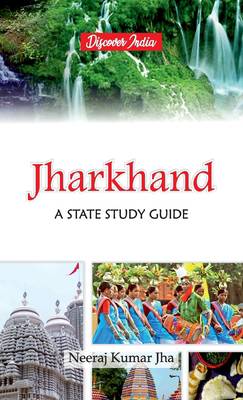
- Afhalen na 1 uur in een winkel met voorraad
- Gratis thuislevering in België vanaf € 30
- Ruim aanbod met 7 miljoen producten
- Afhalen na 1 uur in een winkel met voorraad
- Gratis thuislevering in België vanaf € 30
- Ruim aanbod met 7 miljoen producten
Omschrijving
Jharkhand (lit. "Bushland" or The land of forest) is a state in eastern India, carved out of the southern part of Bihar on 15 November 2000. The state shares its border with the states of Bihar to the north, Uttar Pradesh to the northwest, Chhattisgarh to the west, Odisha to the south and West Bengal to the east. It has an area of 79,710 km (30,778 sq mi). The city of Ranchi is its capital and Dumka its sub capital. Jharkhand suffers from resource curse; It accounts for more than 40% of the mineral resources of India, but it suffers widespread poverty as 39.1% of the population is below the poverty line and 19.6% of the children under five years of age are malnourished.
The state is primarily rural, with only 24% of the population living in cities. The Government of Jharkhand also known as the State Government of Jharkhand, or locally as State Government, is the supreme governing authority of the Indian state of Jharkhand and its 24 districts. It consists of an executive, led by the Governor of Jharkhand, a judiciary and a legislative branch. Jharkhand politics has been at the center of interest right from early days of the state's creation, following its breakaway form Bihar in 2000. Politics in Jharkhand has an old history. It has been the site of many tribal revolutions right from the British days and it was a similar kind of insurgence that led to the creation of the independent state of Jharkhand. Jharkhand has the country's two biggest steel plants at Bokaro in the public sector and Tata Iron and Steel Company (TISCO) in Jamshedpur in the private sector. Other important industries are Tata Engineering and Locomotive Company, Sriram Bearing, Usha Martin, Indian Tube Company, etc. The book is of great importance for the scholars, researchers, students, teachers and historians as well pertaining to this sphere.
Specificaties
Betrokkenen
- Auteur(s):
- Uitgeverij:
Inhoud
- Aantal bladzijden:
- 218
- Taal:
- Engels
Eigenschappen
- Productcode (EAN):
- 9789388318754
- Verschijningsdatum:
- 14/03/2020
- Uitvoering:
- Hardcover
- Formaat:
- Genaaid
- Afmetingen:
- 140 mm x 216 mm
- Gewicht:
- 426 g

Alleen bij Standaard Boekhandel
Beoordelingen
We publiceren alleen reviews die voldoen aan de voorwaarden voor reviews. Bekijk onze voorwaarden voor reviews.











